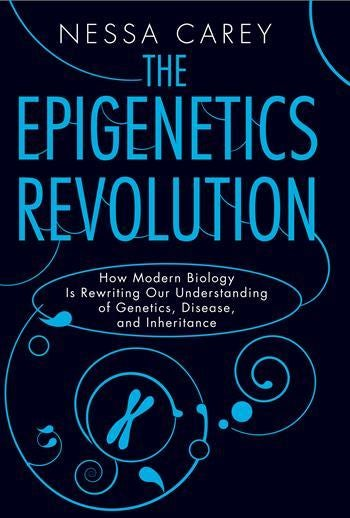The Epigenetics Revolution, by Nessa Carey
Advocates of psychotherapy do not defend a purely psychological understanding of mental disorders, and the backlash against the [bio-bio-bio] model does not deny the etiological role of genetics or neurobiology. Rather, it reflects the emergence of a more systematic focus on the interactions among biological, social, and cultural factors. Epigenetics has come to provide not only empirical data but also a model, insofar as it concerns the study of changes in the regulation of gene activity and expression that do not depend on gene sequence but are heavily influenced by the environment (Carey 2012; Meloni 2013, 2014a, 2014b; Rose 2013b).
The epigenetic approach has profound implications for research, mental health services, and prevention, as it replaces the earlier focus on genetic predispositions and inborn susceptibility or vulnerability and opens ways for showing how an adverse social environment “gets into the mind” and “under the skin” (Hyman 2009) and affects mental health (Toyokawa et al. 2012). [...]
In the case of schizophrenia, nutritional intake (an environmental factor) can affect epigenetic processes associated with the disorder. The study of survivors of the Dutch “Hunger Winter” of 1944 and of the Great Chinese Famine of 1959–1961, both of which implied prenatal food deprivation, revealed a twofold increase in the cumulative risk of schizophrenia in the birth cohort. The effect of such deprivation on the IGF2 gene, which provides instructions for making a protein that plays an essential role in prenatal development, offers a plausible epigenetic mechanism for the environmental roots of schizophrenia (Toyokawa et al. 2012). [...]
In short, by aiming to give equal weight to genetics and the environment, the epigenetic trend instantiates a sort of social turn in the biological sciences (Meloni 2014a) and, in any case, represents the breakdown of the bio-biobio model as far as the understanding of psychic distress is concerned.

Book description
Epigenetics can potentially revolutionize our understanding of the structure and behavior of biological life on Earth. It explains why mapping an organism's genetic code is not enough to determine how it develops or acts and shows how nurture combines with nature to engineer biological diversity. Surveying the twenty-year history of the field while also highlighting its latest findings and innovations, this volume provides a readily understandable introduction to the foundations of epigenetics.
Nessa Carey, a leading epigenetics researcher, connects the field's arguments to such diverse phenomena as how ants and queen bees control their colonies; why tortoiseshell cats are always female; why some plants need cold weather before they can flower; and how our bodies age and develop disease. Reaching beyond biology, epigenetics now informs work on drug addiction, the long-term effects of famine, and the physical and psychological consequences of childhood trauma. Carey concludes with a discussion of the future directions for this research and its ability to improve human health and well-being.
Find the book at the link below:


Here's a list of all the other articles mentioned by Vidal and Ortega:
Meloni, Maurizio. 2014a. “How Biology Became Social, and What It Means for Social Theory.” Sociologi...Meloni, Maurizio. 2014b. “The Social Brain Meets the Reactive Genome: Neuroscience, Epigenetics, and...Rose, Nikolas. 2013b. “What Is Diagnosis For?” Conference paper, “DSM-5 and the Future of Diagnosis....Hyman, Steven E. 2009. “How Adversity Gets Under the Skin.” Nature Neuroscience 12 (3): 241–243.
Learn more about epigenetics:










































































0 comments
Sign in or create a free account